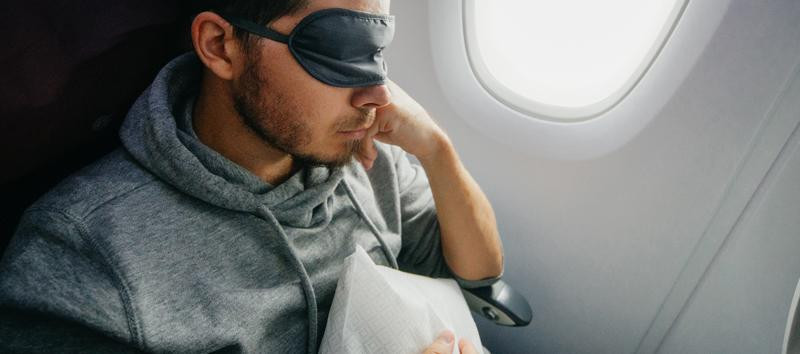Is It Safe To Fly With Concussion? Absolutely, it’s usually safe! Flyermedia.net is here to guide you through the skies, even after a head injury, ensuring you have a smooth and informed journey. Whether you’re dealing with a recent concussion or post-concussion syndrome, understanding the potential impacts and taking proactive measures can make all the difference, let’s explore concussion recovery, flight safety, and brain injury.
1. Understanding Concussions and Air Travel
Flying can be tough, even without a concussion. The hustle, bustle, and unfamiliar environment can overwhelm anyone. Add a concussion into the mix, and things can get even more challenging. But understanding the potential impact of air travel on concussion symptoms is the first step toward a safer journey.
1.1 The Stressors of Air Travel
Air travel presents a unique set of stressors that can exacerbate concussion symptoms:
- Visual and Auditory Overload: Airports and airplanes are filled with bright lights, loud noises, and constant movement, which can be overwhelming for a concussed brain.
- Cognitive Demands: Navigating airports, making quick decisions, and dealing with unexpected delays require mental effort that can strain a recovering brain.
- Stress and Anxiety: The pressure of catching flights, managing baggage, and dealing with potential travel disruptions can increase stress and anxiety levels.
 A busy airport terminal with people walking and bright lights
A busy airport terminal with people walking and bright lights
1.2 How Concussions Affect the Brain
A concussion is a mild traumatic brain injury (mTBI) that temporarily affects brain function. It can cause a range of symptoms, including:
- Headaches
- Dizziness
- Nausea
- Fatigue
- Cognitive difficulties (e.g., memory problems, difficulty concentrating)
- Emotional disturbances (e.g., anxiety, irritability)
These symptoms can be intensified by the stressors of air travel, making it essential to take precautions.
1.3 Is It Safe to Fly Right After a Concussion?
Generally, it is considered safe to fly after a concussion. However, several factors should be considered:
- Severity of the Concussion: Mild concussions with minimal symptoms pose less risk than more severe cases.
- Individual Symptoms: Certain symptoms, such as severe headaches or vertigo, may be worsened by flying.
- Medical Advice: Consulting with a healthcare professional is crucial to determine if flying is safe based on individual circumstances.
1.4 Recent Concussion vs. Post-Concussion Syndrome
- Recent Concussion: This refers to the period immediately following the injury, typically within the first few weeks. During this time, the brain is actively recovering, and symptoms are often more pronounced.
- Post-Concussion Syndrome (PCS): If concussion symptoms persist for more than a few weeks or months, it may indicate PCS. In PCS, the brain struggles to return to its pre-injury state, leading to chronic symptoms.
Flying with PCS is generally safe but may temporarily worsen symptoms.
2. Research and Studies on Flying After a Concussion
While there isn’t extensive research specifically focused on flying after a concussion, some studies provide insights:
2.1 Studies on Athletes and Military Cadets
A small study involving collegiate athletes and military cadets who flew shortly after a concussion found that their symptoms and recovery time were not significantly affected compared to those who did not fly immediately after the injury.
2.2 Studies on NHL Players
Conversely, a study of NHL players who flew within six hours after sustaining a concussion during a game showed a slightly longer recovery time. Researchers suggested that decreased oxygen levels in flight and lack of brain rest could contribute to this delay.
2.3 Brain Rest and Sleep Quality
Research emphasizes the importance of brain rest and sleep quality in concussion recovery. During sleep, the brain clears toxins that accumulate during the day, promoting healing and restoring cognitive function. Studies have shown a correlation between better sleep quality and improved brain function after a brain injury.
 A pill organizer box with various pills.
A pill organizer box with various pills.
2.4 Delayed Onset of Symptoms
It’s possible to experience a delayed onset of symptoms after a concussion, regardless of flying. The stresses of air travel can sometimes trigger or exacerbate symptoms that were initially mild or unnoticeable.
3. Times When Flying Might Not Be Advisable
In certain situations, flying after a concussion may not be advisable without consulting a physician:
3.1 Severe Traumatic Brain Injury (TBI)
If the concussion was the result of a severe TBI involving skull fractures, bleeding, or other serious complications, it’s crucial to seek medical advice before flying.
3.2 Illness and Fever
Flying while sick, whether with a concussion or not, is generally discouraged. Illness can worsen concussion symptoms and pose a risk to fellow passengers.
4. Which Concussion Symptoms Can Be Worsened When Flying?
Flying with a concussion can potentially worsen a variety of symptoms. Here’s a detailed look at how air travel can affect common concussion-related issues:
4.1 Headaches
- The Impact: Headaches are among the most common symptoms following a concussion. The overstimulation from airport noise, constant announcements, and fluorescent lighting can all intensify headache pain. Changes in cabin pressure and altitude can also contribute.
- Mitigation:
- Noise Reduction: Use high-quality earplugs or noise-canceling headphones to minimize auditory stimulation.
- Light Control: Wear sunglasses or an eye mask to reduce the impact of bright lights.
- Hydration: Drink plenty of water to stay hydrated, as dehydration can worsen headaches.
- Medication: If appropriate and with your doctor’s approval, take prescribed or over-the-counter pain relief medication.
4.2 Anxiety
- The Impact: Anxiety and panic attacks can be triggered by the chaotic environment of airports and the stress of flying. The sense of being trapped, coupled with overstimulation, can increase feelings of anxiety.
- Mitigation:
- Breathing Exercises: Practice deep, diaphragmatic breathing to help calm your nervous system.
- Mindfulness: Engage in mindfulness or meditation to reduce anxiety.
- Comfort Items: Bring comfort items such as a favorite book or calming music.
- Early Boarding: Take advantage of early boarding options to reduce stress and allow you to settle in before the crowds arrive.
4.3 Pain and Tension
- The Impact: Neck and shoulder pain are common after a concussion, often exacerbated by poor posture and prolonged sitting. The discomfort of airplane seats and carrying luggage can worsen this pain.
- Mitigation:
- Ergonomic Support: Use a neck pillow and lumbar support to maintain good posture.
- Stretching: Perform gentle neck and shoulder stretches to relieve tension.
- Massage: Consider using a self-massage tool or asking a travel companion to massage your neck and shoulders.
4.4 Extreme Fatigue
- The Impact: Concussions can lead to extreme fatigue as the brain struggles to process information and cope with stress. The demands of travel, including navigating airports, dealing with time zone changes, and disrupted sleep patterns, can intensify fatigue.
- Mitigation:
- Rest: Schedule rest periods before, during, and after your flight.
- Sleep Aids: If appropriate and with your doctor’s approval, use sleep aids such as melatonin to improve sleep quality.
- Avoid Overexertion: Pace yourself and avoid overexerting yourself physically or mentally.
4.5 Nausea and Vertigo
- The Impact: Nausea and vertigo often stem from vestibular system dysfunction, which can be aggravated by movement, altitude changes, and turbulence. The visual stimulation of moving crowds and escalators can also trigger these symptoms.
- Mitigation:
- Motion Sickness Remedies: Use motion sickness remedies such as ginger, acupressure bands, or medications.
- Fixed Gaze: Focus on a fixed point, such as the horizon or a seat back, to stabilize your vision.
- Avoid Triggers: Minimize exposure to visual triggers such as moving crowds or escalators.
4.6 Feeling Overwhelmed
- The Impact: A concussed brain can become easily overwhelmed, leading to difficulty making decisions, processing information, and coping with unexpected changes.
- Mitigation:
- Travel Companion: Enlist a travel companion to assist with decision-making and provide support.
- Pre-Planning: Plan your itinerary in advance to minimize the need for on-the-spot decisions.
- Breaks: Take frequent breaks to rest and recharge your brain.
5. Minimizing Concussion Symptoms: A Proactive Approach
Prevention is key to managing concussion symptoms while flying. Here’s a comprehensive strategy to minimize discomfort and ensure a smoother journey:
5.1 Pre-Flight Planning: Setting the Stage for Success
- Travel Companion: If possible, travel with a companion who can provide support, assistance, and a sense of security.
- Airport and Airline Resources: Take advantage of resources offered by airports and airlines for travelers with disabilities, such as assistance with baggage, security, and boarding.
- Upgrade Your Seat: If your budget allows, consider upgrading to business or first class for more comfortable seating, additional space, and a quieter environment.
- Lists and Schedules: Create detailed lists of items to pack and tasks to complete, along with a daily schedule to minimize stress and confusion.
- Meal Planning: Plan your meals in advance to ensure you have access to healthy, nutritious food that supports brain recovery.
- Transportation Arrangements: Carefully consider transportation options at your destination, opting for alternatives to driving if possible.
- Rest and Recovery: Schedule ample time for rest and recovery after arriving at your destination before engaging in activities.
5.2 Managing Time Zone Changes
- Gradual Adjustment: If your flight involves crossing time zones, gradually adjust your sleep schedule in the days leading up to your trip.
- Sleep Medications: Consult with your doctor before using sleep medications to manage jet lag.
- Sleep Hygiene: Maintain good sleep hygiene practices, such as creating a dark, quiet sleep environment and avoiding caffeine and alcohol before bed.
- Medication Schedule: Plan how to manage your medication schedule across time zones, consulting with your doctor as needed.
- Pill Organizer: Use a pill organizer to keep track of medications and ensure you don’t miss a dose.
5.3 In-Flight Strategies for Symptom Management
- Hydration and Nutrition: Stay well-hydrated by drinking plenty of water and pack healthy snacks to avoid hunger and dehydration.
- Avoid Stimulants: Limit or avoid alcohol and caffeine, as they can exacerbate concussion symptoms.
- Noise Reduction: Use high-quality earplugs or noise-canceling headphones to minimize auditory stimulation.
- Light Control: Wear sunglasses or an eye mask to reduce the impact of bright lights.
- Breathing and Meditation: Practice deep breathing exercises and meditation to manage anxiety and promote relaxation.
- Hygiene: Take steps to avoid getting sick by washing your hands frequently and wearing a mask if necessary.
- Pace Yourself: Anticipate situations that may trigger symptoms and pace yourself accordingly, taking breaks as needed.
- Delayed Disembarkation: If possible, wait for the crowds to clear before disembarking from the plane.
 A busy airport terminal with people walking and bright lights
A busy airport terminal with people walking and bright lights
5.4 Post-Flight Recovery: Reaping the Rewards of Careful Planning
- Rest and Stabilization: Prioritize rest and stabilization upon arrival, allowing your brain to recover from the stresses of travel.
- Healthy Diet: Maintain a healthy diet to support brain function and overall well-being.
- Adequate Sleep: Aim for adequate sleep to promote healing and recovery.
- Seek Assistance: Don’t hesitate to ask for help when needed, whether from travel companions, airport staff, or healthcare professionals.
- Patience: Be patient with yourself and allow ample time for recovery, recognizing that travel can put a strain on your brain.
6. Additional Tips for a Smoother Flight
Here are some additional tips to enhance your travel experience while managing concussion symptoms:
6.1 Communication is Key
- Inform Airline Staff: Inform airline staff about your condition so they can provide assistance if needed.
- Travel Companion: If traveling with a companion, ensure they are aware of your symptoms and how to assist you.
6.2 Comfort Measures
- Comfortable Clothing: Wear comfortable, loose-fitting clothing to minimize physical discomfort.
- Personal Items: Bring familiar items such as a favorite blanket or pillow to create a sense of comfort and security.
6.3 Managing Light and Noise
- Sunglasses: Wear sunglasses even on cloudy days to reduce glare and visual stimulation.
- Earplugs: Use earplugs to block out background noise and create a more peaceful environment.
6.4 Staying Organized
- Medication List: Keep a list of your medications, dosages, and schedules with you at all times.
- Important Documents: Keep important documents such as your passport, tickets, and medical information readily accessible.
7. Flyermedia.net: Your Resource for Aviation and Travel Information
At Flyermedia.net, we are committed to providing you with up-to-date, accurate, and accessible information on all aspects of aviation and travel. Whether you’re seeking guidance on flight training, aviation news, career opportunities, or travel tips, we have you covered.
7.1 Explore Flight Training Options
Discover reputable flight training schools in the USA and explore various aviation career paths. Flyermedia.net offers comprehensive resources to help you pursue your dreams of flying.
7.2 Stay Informed with Aviation News
Keep abreast of the latest developments in the aviation industry with our curated news feed. From technological advancements to regulatory updates, Flyermedia.net delivers the information you need to stay informed.
7.3 Discover Career Opportunities
Explore a wide range of career opportunities in the aviation sector, from pilots and engineers to air traffic controllers and maintenance technicians. Flyermedia.net provides insights into job requirements, training programs, and career advancement opportunities.
7.4 Access Travel Tips and Advice
Navigate the complexities of air travel with our practical tips and advice. From packing strategies to airport navigation, Flyermedia.net offers guidance to make your journey smoother and more enjoyable.
8. Conclusion: Empowering You to Fly Safely
Flying with a concussion requires careful planning, preparation, and awareness. By understanding the potential impact of air travel on concussion symptoms and taking proactive measures to minimize those effects, you can enjoy a safer and more comfortable journey. Flyermedia.net is here to support you with comprehensive information and resources, empowering you to make informed decisions and pursue your passion for aviation and travel.
Remember, your well-being is our top priority. If you have any concerns about flying with a concussion, consult with your healthcare provider to ensure it is safe and appropriate for your individual circumstances. Safe travels and happy landings from Flyermedia.net!
If you’re looking for more information about flight training, aviation news, and career opportunities, visit flyermedia.net today. For additional support, you can reach us at Address: 600 S Clyde Morris Blvd, Daytona Beach, FL 32114, United States or Phone: +1 (386) 226-6000.
9. FAQ: Your Questions Answered About Flying with a Concussion
9.1 Is it generally safe to fly with a concussion?
Yes, it is usually safe to fly with a concussion, but it depends on the severity of your symptoms and how recent the injury was.
9.2 What are the main concerns when flying with a concussion?
The main concerns include overstimulation, stress, changes in air pressure, and potential worsening of symptoms like headaches, dizziness, and fatigue.
9.3 Can flying make my concussion symptoms worse?
Yes, the stressors of air travel can exacerbate concussion symptoms temporarily.
9.4 How soon after a concussion can I fly?
It’s best to consult with a doctor, but if symptoms are mild and well-managed, flying within a few days of a concussion may be possible.
9.5 What precautions should I take before flying with a concussion?
Plan ahead, get plenty of rest, stay hydrated, avoid alcohol and caffeine, and consider using noise-canceling headphones or an eye mask.
9.6 Is it safe to fly with post-concussion syndrome?
Yes, but be prepared for a potential temporary increase in symptoms. Take extra precautions to manage your symptoms during and after the flight.
9.7 What if I feel fine after a concussion; do I still need to worry about flying?
Even if you feel fine, delayed onset of symptoms is possible. Take it easy and be prepared for symptoms to emerge during or after the flight.
9.8 Should I inform the airline about my concussion before flying?
It’s a good idea, especially if you need assistance with baggage, boarding, or seating.
9.9 What can I do during the flight to minimize symptoms?
Stay hydrated, avoid alcohol and caffeine, use noise-canceling headphones or earplugs, wear sunglasses or an eye mask, and practice relaxation techniques.
9.10 Are there any times when I absolutely should not fly with a concussion?
If you have a severe TBI, skull fracture, or significant bleeding, consult with your doctor before flying. Also, avoid flying when you’re sick or have a fever.
10. External References
To ensure the accuracy and reliability of the information provided in this article, we have consulted and referenced the following reputable sources:
- Centers for Disease Control and Prevention (CDC)
- National Institutes of Health (NIH)
- Embry-Riddle Aeronautical University
- Federal Aviation Administration (FAA)
- International Air Transport Association (IATA)
These references provide additional information and resources for those seeking a deeper understanding of concussions, air travel safety, and aviation-related topics.
